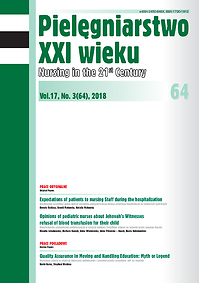Opinions of pediatric nurses about Jehovah’s Witnesses refusal of blood transfusion for their child
DOI:
https://doi.org/10.2478/pielxxiw-2018-0028Keywords:
pediatric nurses, Jehovah’s Witnesses, blood treatment, ethical problemsAbstract
OPINIONS OF PEDIATRIC NURSES ABOUT JEHOVAH’S WITNESSES REFUSAL OF BLOOD TRANSFUSION FOR THEIR CHILD
Introduction. Jehovah’s Witnesses absolutely refuse having blood transfusion performed. The situation is even more difficult when the refusal of blood transfusion concerns a child. Despite existing legal solutions, medical staff experiences value conflicts.
Aim. To analyze the opinions of pediatric nurses about problems that may arise in case of Jehovah’s Witnesses refusal of blood transfusion for their child.
Material and methods. Quantitative research was based on a diagnostic survey method. The variables were measured with the use of a survey questionnaire co-developed by the authors. A group of 104 pediatric nurses from the South-East Poland participated in the study.
Results. To the question “Have you ever encountered the situation throughout all your working career when parents refused their child to undergo a blood treatment due to their beliefs?”, 67.31% (n = 70) of the respondents replied the situation rarely happened. Half of the nurses surveyed (n = 52, 50.02%) admitted they did not accept the position of Jehovah’s Witnesses concerning blood treatment. Most of the nurses surveyed – 87.38% (n = 89) think the existence of procedures on how to proceed in this difficult situation is crucial, and 83% (n = 86) of the respondents admitted that there was no better solution than the already existing legal procedure.
Conclusions. The most difficult experience of pediatric nurses in the situation of Jehovah’s Witnesses refusal of blood transfusion for their child is in the opinion of surveyed nurses, endangering the child’s health or even life. Thus, most of the respondents agree that the best solution in that case is to implement a legal procedure that allows blood transfusion despite parents’ refusal.
References
1. Dunn HP. Etyka dla lekarzy, pielęgniarek i pacjentów. Tarnów: Wyd. Biblos; 1997.
2. Pietrzkiewicz A. Przetaczanie krwi u Świadków Jehowy. Pielęgniarstwo Polskie 2011; 1 (39): 55-56.
3. Effa-Heap G. Blood transfusion: implications of treating a Jehovah’s Witness patient. Br J Nurs. 2009; 18(3): 174-177.
4. Spencer JR. A point of contention: The scriptural basis for the Jehovah’s Witnesses’ refusal of blood transfusions. Christian Bioethics. 2002; 8 (1): 63-90.
5. Wilson P. Jehowah’s Witness children: when religion and the law collide. Pediatric Nursing. 2005; 17(3): 34-37.
6. Sagy I, Jotkowitz A, Barski L. Reflection on cultural preferences and internal medicine: the case of Jehovah’s Witnesses and the changing thresholds for blood transfusions. J Relig Health. 2017; 56: 732-738.
7. McInroy A. Blood transfusion and Jehovah’s Witness Witnesses: the legal and ethical issues. Br J Nurs. 2005; 14 (5): 270-274.
8. Shaner DM, Prema J. Conversation and the Jehovah’s Witness dying from blood loss. Narrat Inq Bioeth. 2014; 4 (3): 253-261.
9. Allen J, Berrios L, Solimine M, Knott-Craig CJ. Bloodless surgery in a pediatric Jehovah’s Witness. Journal of Extra-Corporeal Technology. 2013; 45 (4): 251-253.
10. Ringnes H, Hegstad H. Refusal of Medical Blood Transfusions Among Jehovah’s Witnesses: Emotion Regulation of the Dissonance of Saving and Sacrificing Life. J Relig Health. 2016; 55: 1672-1687.
Published
Issue
Section
License
Copyright (c) 2018 Authors

This work is licensed under a Creative Commons Attribution-NonCommercial-NoDerivatives 3.0 Unported License.




